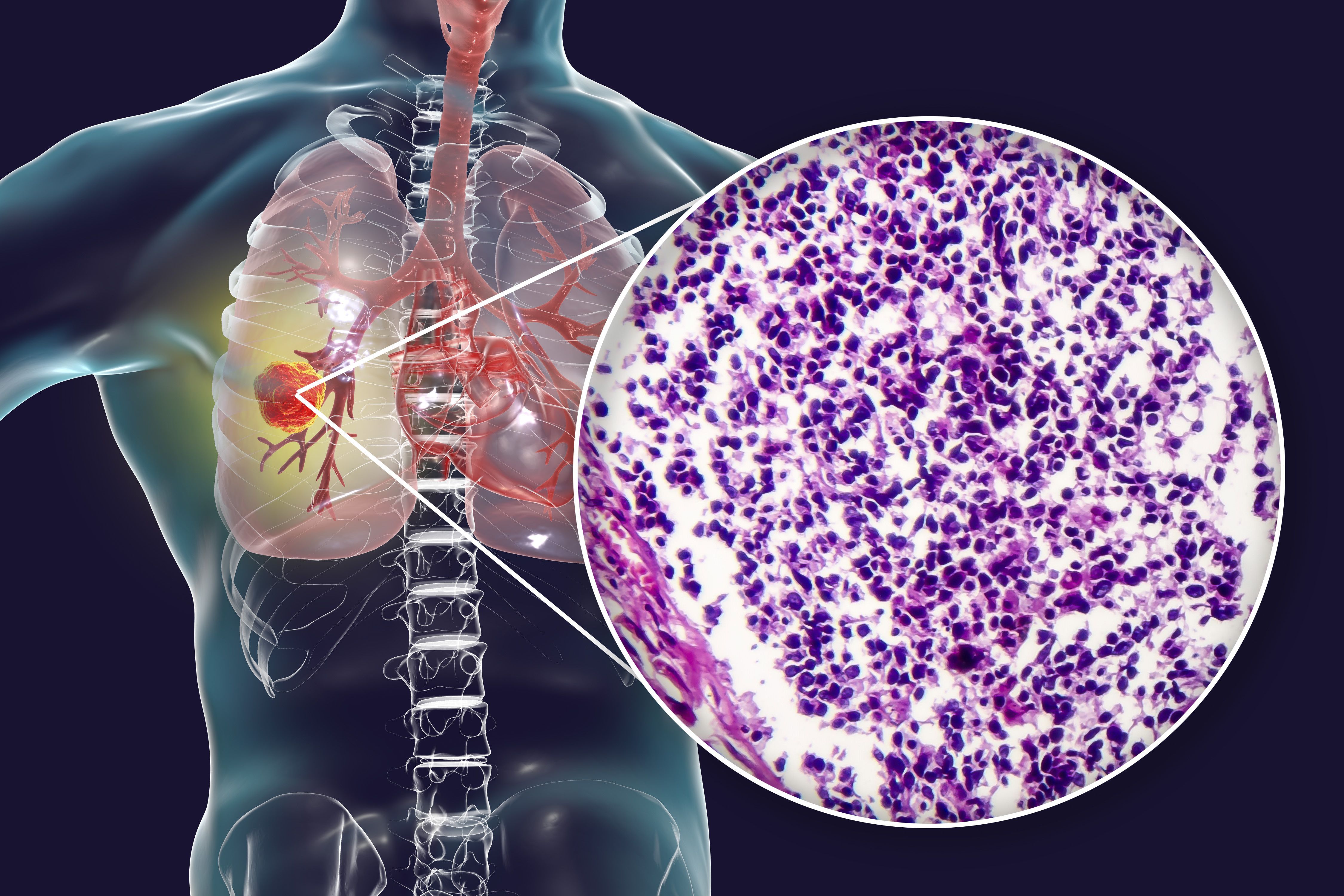Osimertinib Yields Activity, Manageable Toxicity in Metastatic EGFR+ NSCLC
Findings from the phase 2 UNICORN trial support osimertinib as a potential treatment option for patients with metastatic non–small cell lung cancer harboring uncommon EGFR mutations.
“This nonrandomized clinical trial met its primary end point, with osimertinib showing clinical activity with manageable toxic effects for previously untreated patients with metastatic NSCLC harboring uncommon EGFR mutations other than the exon 20 insertion,” according to the authors of the UNICORN study (jRCTs071200002).

Treatment with osimertinib (Tagrisso) demonstrated clinical activity and a manageable safety profile among patients with metastatic non–small cell lung cancer (NSCLC) harboring EGFR mutations outside of exon 20 insertion mutations, according to findings from the phase 2 UNICORN trial (jRCTs071200002) published in JAMA Oncology.
After a median follow-up of 12.7 months (range, 2.7-30.7), osimertinib produced an overall response rate (ORR) of 55.0% (90% CI, 40.9%-68.5%), which entirely included partial responses (PRs). Additionally, the disease control rate (DCR) was 90.0% (95% CI, 76.3%-97.2%). Data highlighted an ORR of 45.5% (90% CI, 26.9%-65.3%) and 66.7% (90% CI, 43.7%-83.7%) for those with solitary and compound uncommon EGFR mutations, respectively.
Investigators reported a median progression-free survival (PFS) of 9.4 months (95% CI, 3.7-15.2) across the overall population, 5.4 months (95% CI, 3.6-22.7) for those with solitary EGFR mutations, and 9.8 months (95% CI, 5.1-not reached [NR]) for those with compound mutations. The median overall survival (OS) in each respective group was NR (95% CI, 19.3-NR), 23.0 months (95% CI, 12.3-NR), and NR. Additionally, the median duration of response (DOR) was 22.7 months (95% CI, 9.5-NR), 22.7 months (95% CI, 3.6-22.7), and NR (95% CI, 5.7-NR) in each respective group.
“This nonrandomized clinical trial met its primary end point, with osimertinib showing clinical activity with manageable toxic effects for previously untreated patients with metastatic NSCLC harboring uncommon EGFR mutations other than the exon 20 insertion,” the study authors wrote. “The results support the use of osimertinib as a treatment option for this patient population.”
Investigators of the multicenter, open-label, nonrandomized phase 2 UNICORN trial assessed 40 patients across 32 hospitals associated with the Tokyo Cooperative Oncology Group. Osimertinib was administered at 80 mg orally once a day until unacceptable toxicity or disease progression. The study also allowed for patients to receive treatment at a reduced dose of 40 mg once daily.
The study’s primary end point was ORR as determined via blinded independent central review committee assessment. Secondary end points included DCR, PFS, time to treatment failure, OS, DOR, and safety.
Patients with histologically confirmed and previously untreated metastatic NSCLC harboring EGFR mutations besides exon 20 insertions were able to enroll on the trial. Additional eligibility criteria included having an ECOG performance status of 0 to 2 and 1 or more measurable lesions according to RECIST v1.1 guidelines.
The median patient age was 72.0 years (range, 39.0-88.0), and most were male (55.0%). Additionally, most patients had an ECOG performance status of 0 (50.0%), adenocarcinoma histology (92.5%), stage IV disease (77.5%), and G719X mutations (50.0%). Most metastatic sites consisted of bone metastases (50.0%) followed by pulmonary metastases (47.5%) and brain metastases (25.0%).
Among those with a G719X solitary mutation, the ORR was 30.0% (90% CI, 10.8%-60.3%), and the median PFS was 3.6 months (95% CI, 1.6-9.3). Additionally, the median PFS for patients with brain metastases was 4.5 months (95% CI, 1.6-9.8) compared with 9.8 months (95% CI, 4.4-22.7) in those without. Both patients with evaluable targeted lesions achieved an intracranial response.
Any-grade adverse effects (AEs) affected 100.0% of patients, and 27.5% had a grade 3/4 AE. Common AEs included hypoalbuminemia (90.0%), anemia (80.0%), thrombocytopenia (65.0%), and increased creatinine levels (60.0%). Non-hematologic toxicity included diarrhea (47.5%), acneiform eruption (42.5%), and oral mucositis (32.5%).
Severe AEs were highlighted in 3 patients; all had recovered from these toxicities. Additionally, there were no deaths related to study treatment. Investigators carried out osimertinib dose reductions to 40 mg once daily for 7.5% of patients.
Reference
Okuma Y, Kubota K, Shimokawa M, et al. First-Line osimertinib for previously untreated patients with NSCLC and uncommon EGFR mutations: the UNICORN phase 2 nonrandomized clinical trial. JAMA Oncol. 2024;10(1):43-51. doi:10.1001/jamaoncol.2023.5013